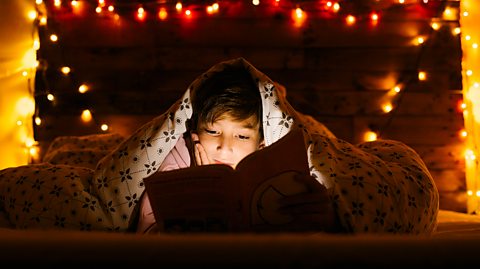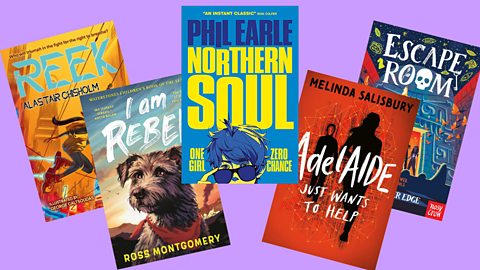Why reading is important
Whether it's parents, carers or teachers, there's an awful lot of people in our lives that try and get us into the habit of reading. But maybe halt those rolling eyes for a moment, because reading is actually pretty great!
Here at BBC Bitesize we've put together this guide on why reading is good for you, how you can get into it, and how to pick out your next riveting read…
1. How often should we be reading?
There's no one-size-fits-all answer when it comes to the rules of reading. While received wisdom tends to dictate that 15-30 minutes of daily reading is the way to go, it basically just boils down to what works for you!
Our advice? Start with something small and manageable, whatever that is for you. Be it five minutes before you go to bed, or an hour before you set off to school - any amount that can get reading into your daily routine.
From there, you can always increase or decrease that amount, depending on your schedule. It's also important not to beat yourself up if you miss a day. Don't let it become a chore!

2. How can I read more?
Lots of us are guilty, from time to time, of neglecting our need to read - and there's a number of reasons for that!
For many people, reading just doesn't seem fun, merely a chore to get through for school or homework. If that sounds like you, you're not alone, with a National Literacy Trust (NLT) study finding that only one in three young people (aged 8-18) would say they enjoy reading in their spare time.
But how can we fix that?
Well, the NLT has some suggestions, based on the findings of their 2025 literacy survey - the main one of which is to align what you read with your personal interests!
For example, reading books connected to films or TV series you might like, or reading books connected to other interests of yours such as sport or music.
It's worth remembering that there are lots of ways to get books into your brain. Be it paperbacks, audiobooks or even book and reading clubs.
3. Why is reading good for you?
Reading can have a whole host of benefits, from improving our mental and physical wellbeing, to giving us greater knowledge about the world and deepening our relationships to those around us.
A 2024 study from The Reading Agency found that regular readers reported higher levels of wellbeing and life satisfaction when compared to non-readers, as well as better levels of sleep and concentration.
Reading also allows us to develop skills like empathy. By putting us in the headspace of a person or character living a totally different life to our own, reading can build our understanding of other people and their experiences.

Studies have shown that our brains react to what we read in a similar way to what we experience. For example, a study in Spain found that reading words related to smell actually activated the sections of the brain that are used when we smell things in real life.
Therefore, reading can allow us to understand other people's emotional experience, which can help us be better friends and family members to those around us.
Reading can also help us expand our vocabularies and knowledge of the world. Reading books about things like history or geography can give us an insight into how people lived in different places or different times.
So with all those benefits, reading really does seem like a no brainer. However, finding what to read can still be a challenge - but don't worry… we've got you covered!
4. What book should I read next?

Figuring out what you should read can be a mammoth undertaking in and of itself.
Whether it's teachers or TikTok, everyone's got an opinion on the tales and titles you should take time out to peruse.
If all that choice is feeling a little overwhelming, and it can, check out our Bitesize Recommends article, featuring five books perfect for reluctant readers.
The books are recommended by best-selling author Chris Bradford and they're carefully chosen to help make sure you love what you pick up and read, at home or on holiday.

Prefer to make your choices a bit more independently?
Here are some things you could bear in mind when picking your next read:
What are you interested in? Picking a book, fiction or non, that links up with your prior interests is more likely to keep you engaged in reading. History buff? Maybe find a non-fiction account of your favourite historical event. Are you a total astro-nut? Go for a classic sci-fi story.
Think about books you've enjoyed before. Whether it's something you read in school, or on your own time, thinking about books you've enjoyed previously can make finding something new to read a whole lot easier. Maybe try out another book by the same author, or in the same genre. Speaking of which…
Think about what types of story you like. Realistic or fantastical, horror or history, thinking about the genre of stories you enjoy can be helpful when trying to find something new to sink your teeth into.
Ask for recommendations. Whether it's a friend or a parent, talking to someone else about what they've enjoyed in the past can be a good way to find something you might also enjoy.
5. What are the best-selling books of all time?
Many books that top the transactional tree sit firmly within the fantasy genre, magical stories that pull us from our own world and whisk us away to lands unknown.
Among these are The Little Prince, The Hobbit, The Lord of The Rings and Harry Potter and The Philosopher's Stone (or The Sorcerer's Stone as it's known in some countries) with each of them selling over 100 million copies respectively.
Other fantasy stories in the all-time best-sellers list are Alice's Adventures in Wonderland by Lewis Carroll, and C.S. Lewis' iconic tale: The Lion, The Witch and The Wardrobe.
Also holding rank with the highest of sellers are a series of iconic authors from across the globe, including Agatha Christie and Charles Dickens.
Another uniting factor of many best-sellers is the fact they're children's books, tales passed down through generations, which helps give them a long-term cultural appeal.

Where can I learn more about reading?
There's plenty more to, erm, read on the Bitesize website.
- Reading skills. Find out about creating parodies, writing in dialect, adapting material for children and more.
- What do YOU enjoy reading in your free time? Read the comments from other children in this Newsround article.
- Seven books that made history. These notable tomes might give you more ideas for what to read next.
- Eight tips to support your child's reading at home. Advice for parents looking to inspire their child to read.